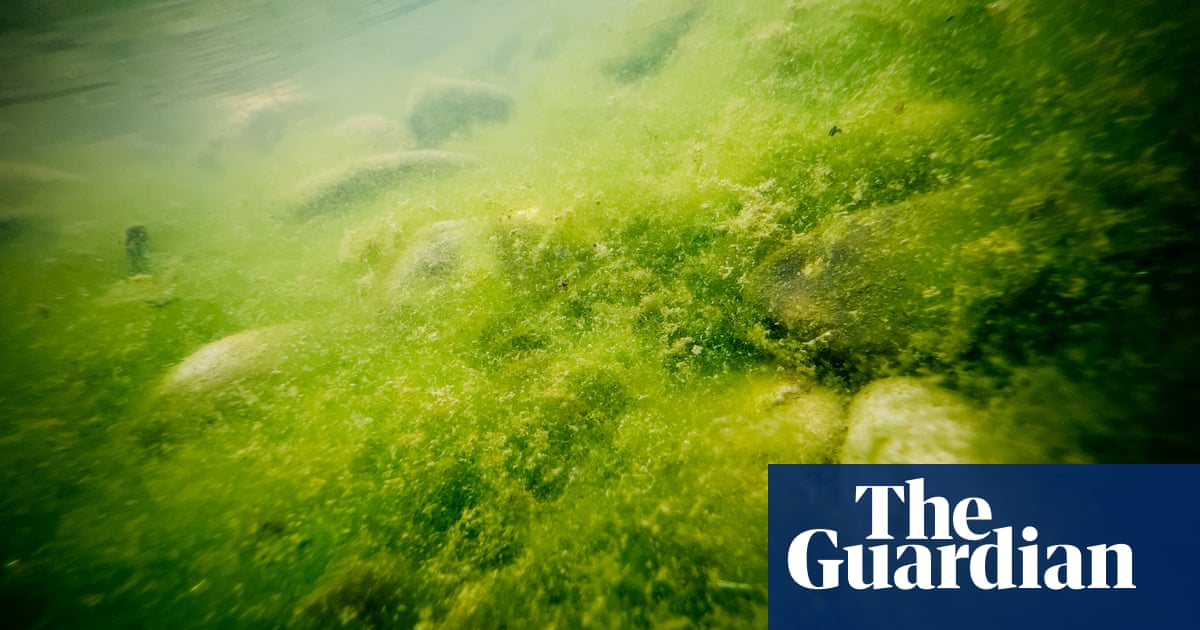
One of the world’s biggest food giants with a supply chain linked to the ecological decline of the River Wye faced claims over similar pollution scandals in the US, the Observer can reveal.
Campaigners warned two years ago that the clear waters of the Wye, one of Britain’s best-loved rivers, were being blighted by thick green algae blooms linked to poultry production.
Many of the intensive chicken farms in the catchment area of the Wye supply Avara Foods in Hereford, which is the third largest poultry producer in Britain and is jointly owned by the American food business Cargill.
It is claimed that vast amounts of manure from chicken farms supplying Avara and other food businesses are washed into the Wye, contaminating the water with excessive phosphate levels that fuel the growth of algae blooms.
An investigation by the Observer has found the potential impact could have been foreseen from legal action stretching back two decades in Oklahoma in the US. Cargill was sued in two separate cases over claims of pollution of water courses from chicken farms in its supply chain.
In 2001, Cargill was among six firms sued by the city of Tulsa over manure polluting lakes Eucha and Spavinaw. The court documents state: “Tulsa alleges the water supply has been adversely affected by an increase of nutrients, specifically phosphorus, which has in turn resulted in excessive algae growth.”
The companies settled out of court, agreeing to pay a combined $7.5m with no admission of liability. They argued that their contracted growers were responsible for managing waste from their farms.
Four years later, in a separate case, the farming supply chains of Cargill and other poultry producers were accused by Oklahoma of polluting the Illinois River, a tributary of the Arkansas. Again, the companies denied liability. The case is ongoing.
Drew Edmondson, the former Oklahoma state attorney general, who filed the lawsuit, said: “Their biggest defence was that there were other sources of phosphorus. They talked about cows. They talked about runoff from parking lots. Our experts said: ‘Yes, that’s true – but overwhelmingly it’s the poultry waste that’s causing this.’”
While the legal cases were being fought in the courtrooms of Oklahoma, more than 4,400 miles away the intensive poultry production lines were being rolled out along the Wye and nearby counties.
Cargill has operated in the UK since 1955 and purchased a major poultry processing plant in Hereford, more than 40 years ago. In 2013 it announced a £35m investment in the plant to increase production of fresh chicken, and five years later it combined its fresh chicken operation in the UK with poultry business Faccenda Foods to form Avara.
New intensive poultry units – each housing at least 40,000 chickens – sprung up to meet the demand, and between 2013 and 2017 the number of birds in Herefordshire increased from 13 million to 18 million.
Avara’s operation is estimated to account for around 85% of the total and the company processes and packs about two million chickens a week in Hereford, supplying major supermarkets and fast-food outlets, including Tesco, Asda and McDonald’s.
Environmental groups warned as far back as 2015 that the Wye was experiencing excessive levels of phosphate, causing the spread of algae blooms. Chicken manure was blamed as one of the key causes.
The chicken litter was spilling directly into the Wye’s catchment area from free-range egg farms while vast amounts generated by enclosed broiler units was used as fertiliser in local farms and was being washed into water courses. Regulators say the pollution is from manure, overuse of fertilisers and sewage treatment works.
In the US, Cargill acknowledged that spreading poultry manure might sully nearby water as far back as 2004. “Our scenic river watersheds are complex environments that include many sources of nutrients that potentially impact the health of our rivers and streams that lie within them,” one advert stated in the Oklahoman newspaper. “We are prepared to do our part to take care of the poultry portion of the nutrient equation.”
Seventeen years later, after vast expansion of chicken farming in the Wye Valley, Cargill again acknowledged it might be a factor in the ecological decline of the river.
In September 2021, John Reed, Avara’s agricultural director, admitted the company was “part of the problem”. He said: “While not a direct contributor to River Wye pollution, we recognise that the use of our chicken litter on land in the Wye catchment does have an impact.”
Reed’s admission was partly prompted by research by Lancaster University, which found chicken litter was the main source of manure causing phosphate pollution on the Wye. The findings were published last December, which identified poultry as the main source.
There are now questions over whether Cargill learned the lessons from what happened in Oklahoma and why councils and government watchdogs failed to realise the risk of pollution.
Dr Tom Tibbits, chair of Friends of the Upper Wye, said: “To see history repeating like this is heartbreaking. Where’s the corporate responsibility? They had the knowledge but didn’t clean up their act.”
Helen Hamilton, a planning consultant who has worked with environmental groups, says she warned planning officials several years ago about the legal actions in Oklahoma. She said: “They sent us away with a flea in our ear. The River Wye is now possibly beyond redemption.”
It is now hoped stricter controls and new practices, supported by Cargill and other operators, will help reduce the Wye pollution. Some farms are installing biomass boilers to generate heat from chicken manure, while other farms are sending the poultry litter to anaerobic digestion plants.
The Environment Agency said: “The River Wye is iconic. The Environment Agency and its partners are working through a nutrient management board to find solutions to tackle phosphate levels. We recently secured additional funding to increase monitoring activity.” Cargill and Avara did not respond to requests for comment.












